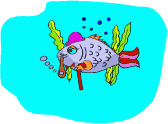 |
Fishing Stories from Ned Kehde |
|
Fishing Reports Reader's Nook Angler's Academy Club Corner Tournament Trail Success Stories Kansas Angler Info Angler Links |
Submitted by Ned Kehde - June 1, 2000 The heyday of pond fishing in eastern Kansas occurred in the 1950s and early 1960s. And during that spell, the king of the farm-pond anglers was the late Chuck Wood of Kansas City. Tales still abound about Wood's prowess. There are stories on how he designed the Beetle and its companion the Beetle Spin, as well as the Puddle Jumper, and waylaid an inestimable number of fish on those diminutive lures. Ultimately all three of those lures became an integral part of many anglers' repertoire all around the nation. There are other stories, which are devoid of even a hint of hyperpole, about how Wood could virtually annihilate the bass population in a two-acre pond within a week. Of course, those were the days before the catch-and-release ethic became the primary tenant in the bass anglers' code of conduct. Across the years, Woods introduced lots of Kansans to the art of wielding spinning outfits and small lures for bass. For instance in the 1960s, Wood became a mentor to Drew Reese and Dwight Keefer, who were students at Shawnee Mission North High School and Kansas University. Wood's tutoring paid grand dividends, because Keefer won the World Series of Freshwater Fishing in 1969. Then Reese garnered a berth at the first BASS Masters Classic, and several years later Keefer fished the Classic. About the time Keefer and Reese began strutting their talents nationally, the bass fisherman's love affair with farm ponds began had waned in eastern Kansas. A lot of it had to do with construction of big reservoirs by the U.S. Army Corps of Engineers and the development of boats for bass fishermen to use on the big lakes. Since the 1970s, a mania for bass boats and big reservoir fishing spread at full-tilt across the heartland. Now Wood's farm ponds are considered the province of the novice angler or a place where a serious angler takes his kids to teach them a few of the ropes. But for many complex reasons, Bob Laskey of Lawrence decided to go against this tide in 1996. He dropped out of the local bass club, stopped fishing tournaments, and he even sold his big candy-colored, metal-flaked bass boat. In essence, he became a piscatorial minimalist and nearly a reincarnation of Chuck Wood. Consequently, Laskey has become an aficionado of spinning tackle and small jigs, and he spends the preponderance his days afloat at farm ponds and community lakes. By employing a medium-action spinning outfit and a small jig at farm ponds, it's likely that Laskey has caught and released more bass this year than the combined catch of all the members of his old bass club. Recently, for instance, on an unseasonably hot and extraordinarily windy late spring day, Laskey and a friend ventured to a two-acre pond. It was far too windy to comfortably fish a bigger body of water. But at this pastoral waterway, the fishing was easy and bountiful. Here they used l/8-ounce marabou jigs, which they retrieved at a moderate pace, working the jigs over and around a tapestry of aquatic weeds. From these weeds, Laskey and his friend caught and released more than a 150 bass, and the biggest surpassed six pounds. |
|
Kansas Angler Online Sponsor  |
Copyright 2000 by The Kansas Angler - P.O. Box 12261 - Wichita, KS 67211 - Phone 316-265-5551 Questions or problems with this website should be directed the link above. This Page Last Updated on date shown at top of page. |

